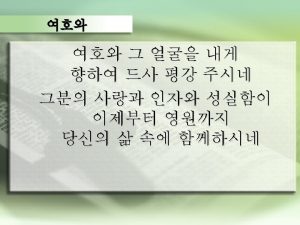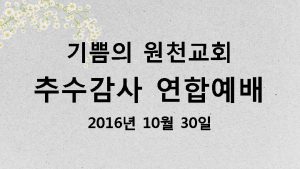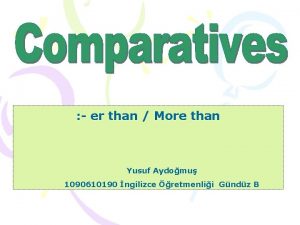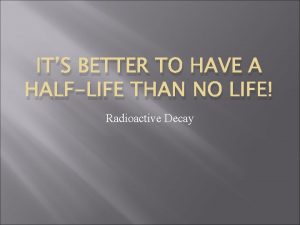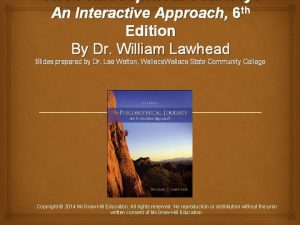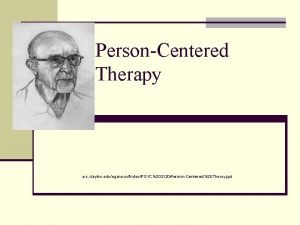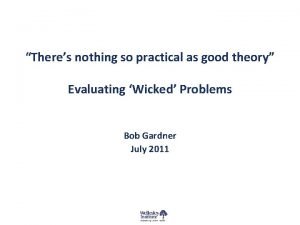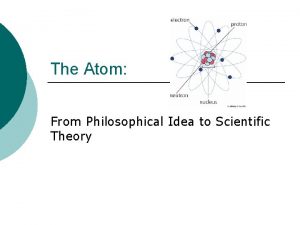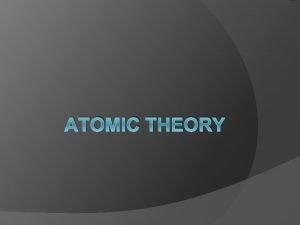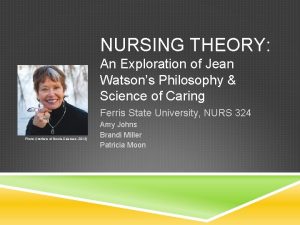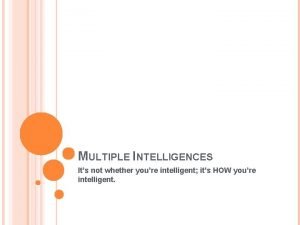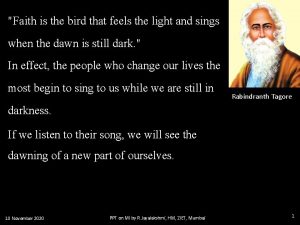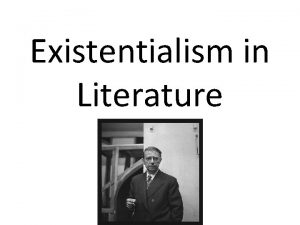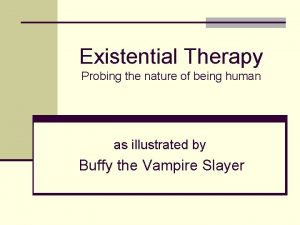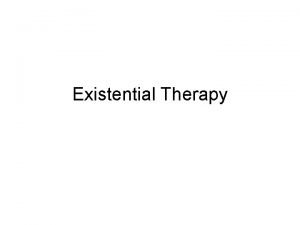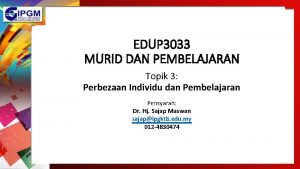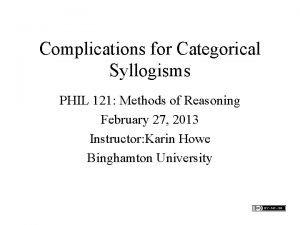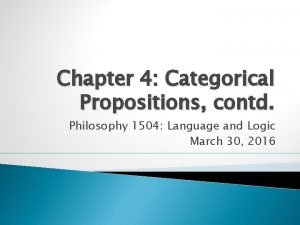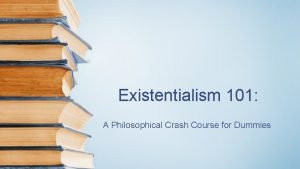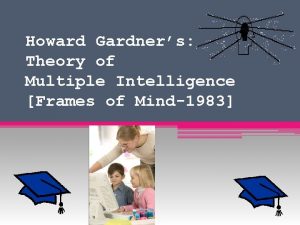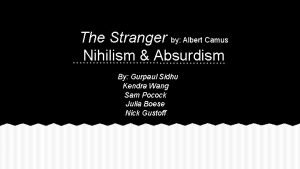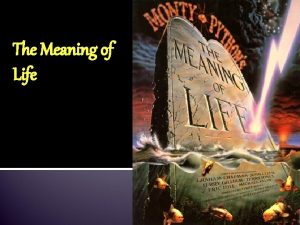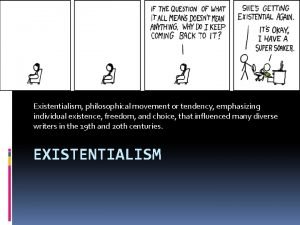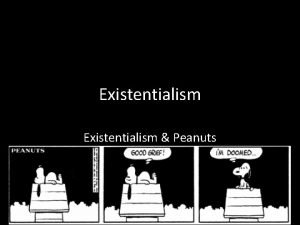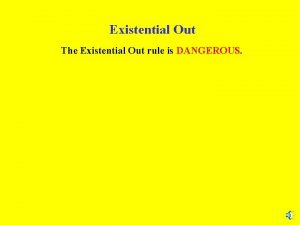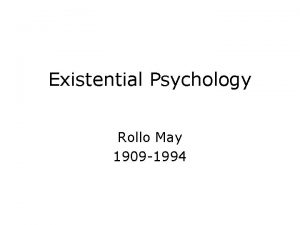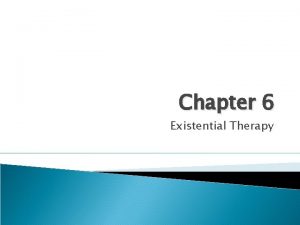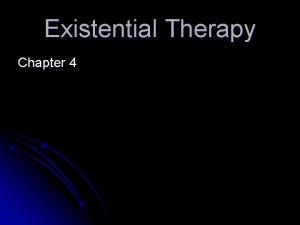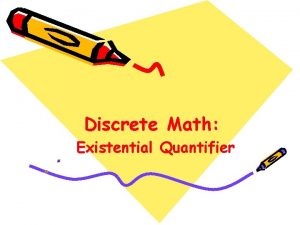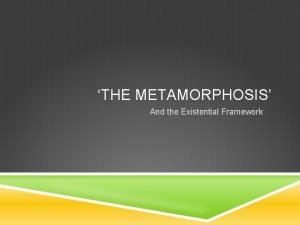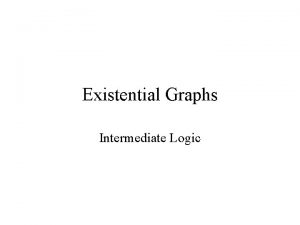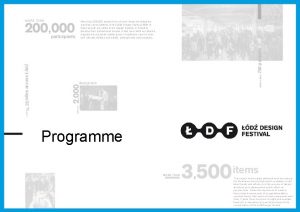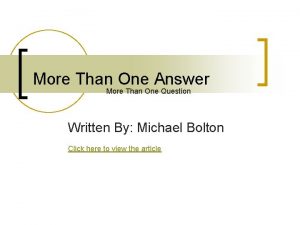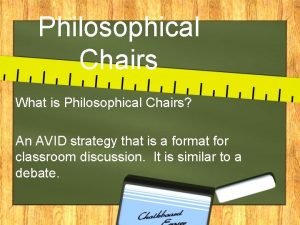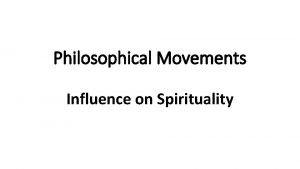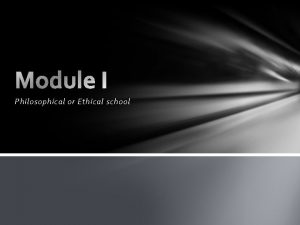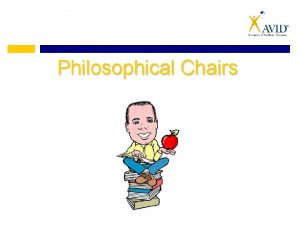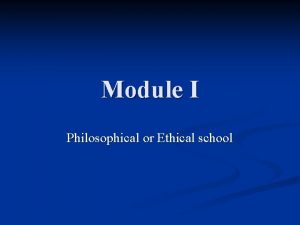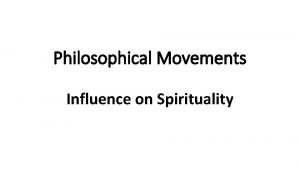Existential Theory More of a philosophical approach than































- Slides: 31

Existential Theory More of a philosophical approach than a separate theory; offers ideas and themes for counseling.

Existential View of Human Nature: • Realistically Optimistic • People struggle with universal concerns of death, freedom, isolation, & meaning • Anxiety can cause unhappiness & despair

Existential Philosophers • Kierkegaard: the “grandfather” of existentialism • Nietzsche (1844 -1900) emphasized the importance of human subjectivity. • Edmund Husserl (1859 -1938): promoted existentialism as a phenomenological approach

Best known existential counseling theorists: • Viktor Frankl • Rollo May (1909 -1994) - dealt with issues of anxiety, dealing with power, accepting freedom, developing identity • Irvin Yalom

Podcast Explaining Existential Therapy • If you are interested in listening to a discussion of existential theory, please click on the hyperlink below to be taken to a podcast. This podcast can be downloaded and “taken on the road” • http: //www. socialworkpodcast. com/Existentia l 64. mp 3 • The narrator of the podcast uses our text, so much of the information covered in this presentation will be discussed in the podcast. If you learn more effectively through listening, please take advantage of the audio.

Phenomenology: • Defined: A method of exploration that uses subjective human experiencing as its focus. • Phenomenological theories/philosophies include: Adlerian, person-centered, Gestalt, existential, and reality therapies.

Approaches to Existentialism • Dynamic existentialism: focuses attention on the resolution of inner conflict and anxiety. • Humanistic existentialism: emphasizes unconditional acceptance, awareness of personal experience, and authenticity rather than resolving conflicts. • Transpersonal existentialism: perceives death as an opportunity for the individual to rise above the circumstances. (Tragedy vs. joy)

Key idea of existentialism: Deals with the dynamic or everchanging transitions that individuals encounter as they emerge, evolve, and become.

Existentialism addresses: • “Who will I be? ” • “Who am I? ” • “Where do I come from? ” • The importance of time with emphasis on the present in understanding self and the world.

Major concepts addressed by existentialism: • • • Being-in-the-world Four ways of being Time and Being Anxiety Living and Dying Freedom, Responsibility, & Choice • Isolation and Loving • Meaning and Meaninglessness • Striving for Authenticity

BEING-IN-THE WORLD: “I AM” • Four Ways of “Being” 1. The Biological world or environment 2. The “with world” or area of human relationships 3. The “own world” or relationship one has with oneself 4. The Uberwelt or beliefs about the world (usually religious or spiritual)

Time and Being • Focus is on future, past, and present. • The individual is in the process of selfactualization and moving into an immediate future. • Past is used solely for”history & development. ”

Anxiety: Two major types 1. Normal Anxiety: 3 features • Appropriate to the situation • Not usually repressed • Provides an opportunity to confront dilemmas, such as dying, responsibility, and choices. 2. Neurotic Anxiety: Blown out of proportion, inappropriate, destructive

LIVING AND DYING: • Death is inevitable; therefore, the awareness of death should not cause dread, but should inspire us to live a creative life. • Death is not a threat, but is an urging for us to live our lives fully and take advantage of each opportunity to do something meaningful.

Freedom, Responsibility, & Choice • In the pursuit of freedom, individuals are responsible for their own world, their life plans, and their choices. • These concepts are interrelated as we are free to choose in what ways we will be responsible for leading our lives and what values are significant to us.

Isolation and Loving • Existential isolation refers to being separated from the world; the feeling of being totally alone and feeling “nothingness. ” • Loving relationships overcome the sense of existential isolation (“I-thou”)

Meaningfulness & Meaninglessness • Out of our will to love and live, we arrive at meaning in our lives. • We find meaning in our world by fully being aware of ourselves (transcendence) • Meaning is implicit in discovering ourselves and awareness of others.

Striving for Authenticity • Authenticity is a central genuineness and awareness of being. • Authentic persons are grounded, honest, and compassionate. • The antithesis of authenticity is vulnerability • Authentic people are true to their own values and goals (not others).

The Therapeutic Relationship • The core of the existential connection is the “I to thou” relationship • The therapist is merely a guide to the counselee’s journey of selfdiscovery

Components of therapeutic relationship 1. Therapeutic love - “loving friendship” Counselor must strive to develop a genuine caring encounter that does not stifle the client’s growth with therapist’s needs. • Counselor = authentic to self and to client.

Components (cont. ) Resistance • Resistance occurs when client does not take responsibility, is alienated, is not aware of feelings, or is in authentic. • Counselor should establish an authentic relationship with the client, being supportive of the client’s issues

Components of Relationship (cont. ) Transference • Too great a focus on transference interferes with the authentic relationship • Transference can be used as a way to “act out” relationship issues with others • BUT, maintain the authentic relationship.

The Therapeutic Process • Counselor must be “present and involved” with clients • Self-disclosure may be appropriate to help clients fully develop their own sense of authenticity • Counselor should explore existential themes (e. g. , death, freedom, responsibility, etc. )

Intervention Strategies • Telling the Story • Sharing Existence in the Moment • Centered Awareness of Being • Self-Responsibility • Dream Work • Disclosing & Working through Resistance • Confronting Anxiety • Sustaining changes in Being • Closure - the final confrontation with reality

Phases of Counseling • Initial: Counselors assist clients in identifying and clarifying their assumptions about the world; they define and questions the way they perceive and make sense of their existence. • Middle: Clients examine the source and authority of their present value system; form a more clear sense of purpose and meaning. • Final: Clients take what they are learning about themselves and put it into action. Goal is to enable clients to find ways of to pursue a “purposeful existence. ”

Limitations of Existentialism • A subjective approach to an objective world • Relies on verbal exchange and authenticity; does not consider the withdrawn or “avoidance” type • Lacks a guiding theory; non-specific • Lack of scientific exploration to validate the ideas.

Tests that measure Existential Conflict: • Existential/Dialectical Marital Questionnaire: found to be valid and useful with Israeli couples • “Purpose of Life Test” (Crumbaugh & Maholic) measures meaninglessness but lacks validity support • Scales that measure the avoidance of the ontological confrontation of death (AOC) and avoidance of existential confrontation (AEC); Reliability is high but little follow-up support.

Tests (cont. ) • The LRI (“Life Regard Index”) examines meaning in life; theoretically sound but has not been used. • The “Experienced Levels of Emptiness and Existential Concern” and the “Existential Anxiety Scale” also need broader use and further study

Research • According to most: There have been no real efficacy studies on the efficacy of existential theory, although some techniques (i. e, paradoxical intention, etc. ) have been tested. • The lack of research on theory adds to its claim to be more of a philosophy than a specific therapy.

Multicultural considerations • Has been championed as one of the most ethnoculturally sensitive approaches due to the emphasis on the individual experience and self-discovery. • Has the potential to be very multiculturally and gender sensitive as it deals with the individual where he/she is. • Celebrates individual uniqueness

Others disagree • Prochaska and Norcross (2003): “Only in existentialism and the movies do people possess unlimited freedom, construct their own meanings, and execute boundless choices. Save it for the wealthy, worried well” (p. 133). • Obviously not for everyone, but still a process that most experience!
 Lirik lagu more more more we praise you
Lirik lagu more more more we praise you More more more i want more more more more we praise you
More more more i want more more more more we praise you Humanistic existential approach
Humanistic existential approach More er than
More er than 5730x5
5730x5 Greater than god more evil than the devil
Greater than god more evil than the devil Read the philosophical journey: an interactive approach
Read the philosophical journey: an interactive approach Reality therapy ppt
Reality therapy ppt There is nothing so practical as a good theory
There is nothing so practical as a good theory The atom: from philosophical idea to scientific theory
The atom: from philosophical idea to scientific theory Whats the atomic theory
Whats the atomic theory Example of universal existential statement in mathematics
Example of universal existential statement in mathematics Existential fallacy
Existential fallacy Instillation of faith and hope
Instillation of faith and hope Famous person with intrapersonal intelligence
Famous person with intrapersonal intelligence I am existentially intelligent, i am someone who ....
I am existentially intelligent, i am someone who .... Existentialism
Existentialism Existential well being
Existential well being Existential therapy view of human nature
Existential therapy view of human nature Existentialism activities for groups
Existentialism activities for groups Circles of my multicultural self
Circles of my multicultural self Verbal linguistik
Verbal linguistik Existential fallacy
Existential fallacy Existential fallacy
Existential fallacy Existentialism definition for dummies
Existentialism definition for dummies Every pot has a lid conditional statement
Every pot has a lid conditional statement Multiple intelligence theory slideshare
Multiple intelligence theory slideshare Existentialism nihilism absurdism
Existentialism nihilism absurdism Nihilism vs existentialism
Nihilism vs existentialism Existentialism in literature
Existentialism in literature Existentialism examples
Existentialism examples Existential forgery
Existential forgery
